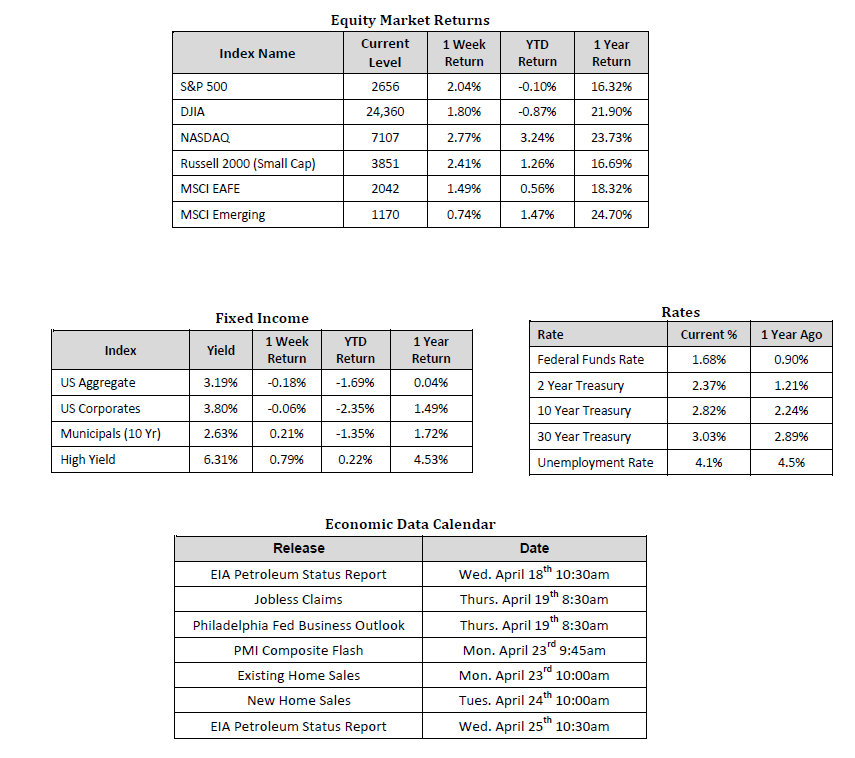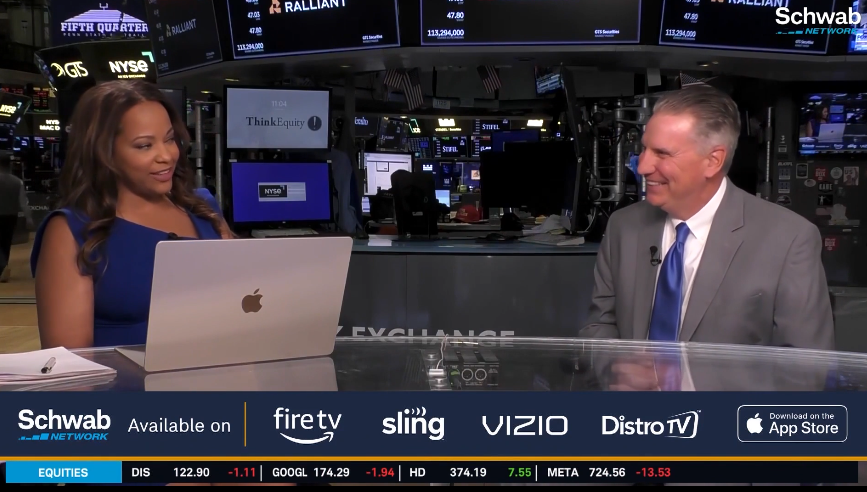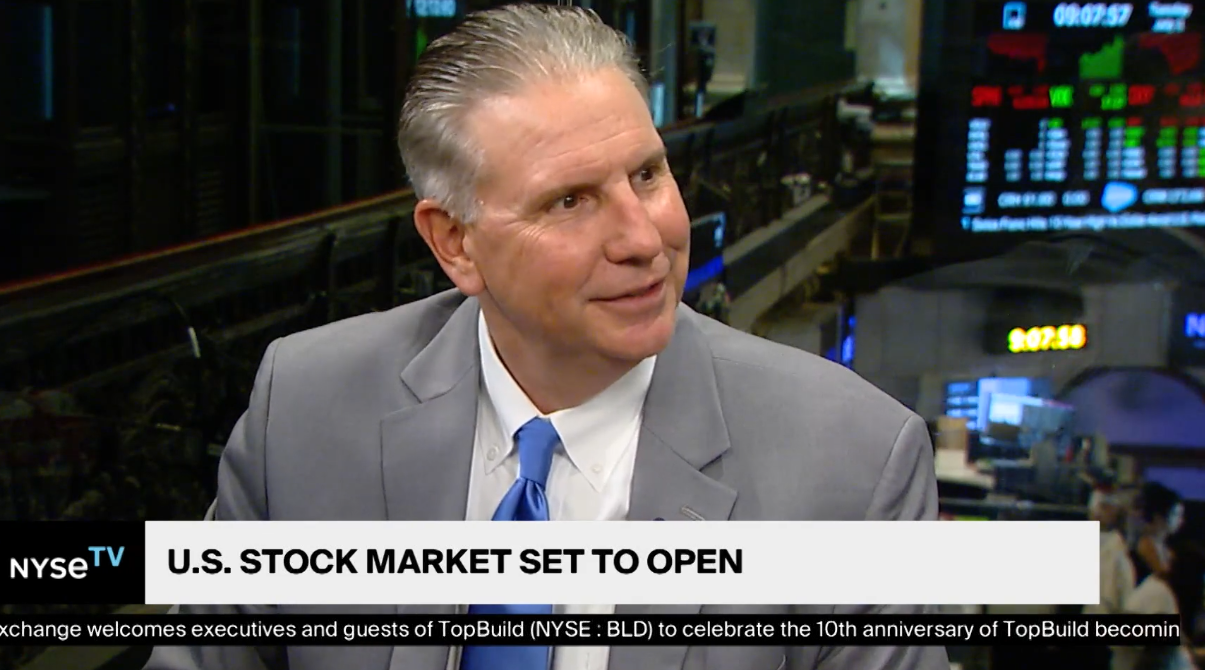
Led by Technology, Stocks Finish the Week Higher Despite Geopolitical Concerns
Market Overview
Sources: Sources for data in tables: Equity Market and Fixed Income returns are from JP Morgan as of 04/13/18. Rates and Economic Calendar Data from Bloomberg as of 04/17/18. International developed markets measured by the MSCI EAFE Index, emerging markets measured by the MSCI EM Index. Sector performance is measured using GICS methodology.
Happening Now
The major indices experienced gains last week, but periods of intermittent volatility persisted. Investors were seemingly comforted by the prospects of strong first-quarter earnings reports. Concerns with global trade negotiations and certain technology stocks also began to ease. As a result, the Dow Jones Industrial Average advanced 1.8%, the S&P 500 Index gained 2.04% and the heavily tech weighted Nasdaq Composite Index led the major indices with a gain of 2.77% for the week.
Some fears that the U.S. and China were heading towards a retaliatory trade war were diminished after a series of interviews with White House officials and a speech from Chinese President Xi Jinping regarding intellectual property rights of foreign firms, reduced duties on imported goods and plans to largely cut tariffs on imported automobiles.
Also on the international front, geopolitical tensions were heightened following a chemical attack from the Syrian government on a rebel-held town, leading the U.S. to suggest that retaliatory military options were under consideration. Russia, which is an ally to Syria and generally supports Syrian President Bashar al-Assad, stated they would shoot down any missiles that the U.S. might fire at Syria. Due to these dual threats, traders pushed oil prices higher, following the belief that a potential slowdown in production could be forthcoming. Accordingly, the S&P 500 energy sector gained 6.0% by the end of last week. (It should be noted that the U.S. did ultimately fire missiles at certain defined targets in Syria on Friday, April 13, 2018).
Back on domestic grounds, Facebook’s CEO Mark Zuckerberg testified on Capitol Hill regarding the data scandal plaguing the company. While it is unclear at this time what the effect of his testimony will have on Facebook, or its stock, Facebook shares climbed 4.7% by the end of the week, helping the tech-heavy Nasdaq Composite finish higher than the two other major U.S. indices cited above.
Despite the length of this current secular bull market, we still see additional upside growth potential for global stocks due in large part to a solidifying global economic foundation. This does not, however, diminish the potential for additional short term bouts of volatility. It remains critical, in our view, that investors revisit their portfolio strategies to help ensure that they have diversification in place to help navigate through these periods of heightened portfolio.
Important Information and Disclaimers
Disclosures: Hennion & Walsh is the sponsor of SmartTrust® Unit Investment Trusts (UITs). For more information on SmartTrust® UITs, please visit www.smarttrustuit.com. The overview above is for informational purposes and is not an offer to sell or a solicitation of an offer to buy any SmartTrust® UITs. Investors should consider the Trust’s investment objective, risks, charges and expenses carefully before investing. The prospectus contains this and other information relevant to an investment in the Trust and investors should read the prospectus carefully before they invest.
Investing in foreign securities presents certain risks not associated with domestic investments, such as currency fluctuation, political and economic instability, and different accounting standards. This may result in greater share price volatility. These risks are heightened in emerging markets.
There are special risks associated with an investment in real estate, including credit risk, interest rate fluctuations and the impact of varied economic conditions. Distributions from REIT investments are taxed at the owner’s tax bracket.
The prices of small company and mid cap stocks are generally more volatile than large company stocks. They often involve higher risks because smaller companies may lack the management expertise, financial resources, product diversification and competitive strengths to endure adverse economic conditions.
Investing in commodities is not suitable for all investors. Exposure to the commodities markets may subject an investment to greater share price volatility than an investment in traditional equity or debt securities. Investments in commodities may be affected by changes in overall market movements, commodity index volatility, changes in interest rates or factors affecting a particular industry or commodity.
Products that invest in commodities may employ more complex strategies which may expose investors to additional risks.
Investing in fixed income securities involves certain risks such as market risk if sold prior to maturity and credit risk especially if investing in high yield bonds, which have lower ratings and are subject to greater volatility. All fixed income investments may be worth less than original cost upon redemption or maturity. Bond Prices fluctuate inversely to changes in interest rates. Therefore, a general rise in interest rates can result in the decline of the value of your investment.
Definitions
MSCI- EAFE: The Morgan Stanley Capital International Europe, Australasia and Far East Index, a free float-adjusted market capitalization index that is designed to measure developed-market equity performance, excluding the United States and Canada.
MSCI-Emerging Markets: The Morgan Stanley Capital International Emerging Market Index, is a free float-adjusted market capitalization index that is designed to measure the performance of global emerging markets of about 25 emerging economies.
Russell 3000: The Russell 3000 measures the performance of the 3000 largest US companies based on total market capitalization and represents about 98% of the investible US Equity market.
ML BOFA US Corp Mstr [Merill Lynch US Corporate Master]: The Merrill Lynch Corporate Master Market Index is a statistical composite tracking the performance of the entire US corporate bond market over time.
ML Muni Master [Merill Lynch US Corporate Master]: The Merrill Lynch Municipal Bond Master Index is a broad measure of the municipal fixed income market.
Investors cannot directly purchase any index.
LIBOR, London Interbank Offered Rate, is the rate of interest at which banks offer to lend money to one another in the wholesale money markets in London.
The Dow Jones Industrial Average is an unweighted index of 30 “blue-chip” industrial U.S. stocks.
The S&P Midcap 400 Index is a capitalization-weighted index measuring the performance of the mid-range sector of the U.S. stock market, and represents approximately 7% of the total market value of U.S. equities. Companies in the Index fall between S&P 500 Index and the S&P SmallCap 600 Index in size: between $1-4 billion.
DJ Equity REIT Index represents all publicly traded real estate investment trusts in the Dow Jones U.S. stock universe classified as Equity REITs according to the S&P Dow Jones Indices REIT Industry Classification Hierarchy. These companies are REITs that primarily own and operate income-producing real estate.




